SERMAYE PİYASASINDA İŞLETMELER AÇISINDAN POLİTİK RİSKİN DEĞERLENDİRİLMESİ
Bir ülkeyi yöneten hükümetlerin ellerinde birtakım yasal güç unsurları vardır. Bu durum devletin temsilcisi konumundaki hükümetler ile yasal çevresel faktörlerle ilgili olan işletmeler arasında olumlu yönde ilişkilerin oluşmasına yol açmaktadır. İyi ilişkiler içinde olsalar da, işletmeler genellikle bir takım politik zorluklarla karşı karşıyadır. Önceden bu tür zorlukları öngörebilen işletmeler, diğerlerine göre önemli bir rekabet avantajı kazanmaktadır. Bu tür risklerin varlığı, risklerin önceden incelemelerinin gerekliliğini de beraberinde getirmektedir. Bu kapsamda çalışmanın amacı işletmeler için önemli bir risk unsuru olan politik risk ile ilgili kavramsal bir çerçeve oluşturmaktır.
Anahtar Kelimeler:
Politik Risk, İşletmeler
EVALUATION OF POLICY RISK FOR ENTERPRISES IN THE CAPITAL MARKET
There are some elements of legal power in the hands of governments that govern a country. This leads to positive relations between governments representing the state and businesses involved in legal environmental factors. Even if they are in good relationships, businesses often face a number of political challenges. Businesses that have been able to predict such challenges in the past have gained a significant competitive advantage over others. The existence of such risks also necessitates the pre-examination of the risks. In this context, it is a conceptual framework for political risk, which is an important risk factor for the intended enterprises to work in.
Keywords:
Political Risk, Enterprises,
___
- Aktepe, C. (1998). Türkiye’de Yabancı Sermaye Yatırımlarını Etkileyen Bir Faktör: Politik Risk, Gazi Üniversitesi Sosyal Bilimler Enstitüsü, Yayınlanmamış Yüksek Lisans Tezi, Ankara.
- Aydın, K. (2013). Uluslararası Pazarlama Açısından Politik Risk ve Yönetimi, Yıldız Teknik Üniversitesi İktisadi ve İdari Bilimler Fakültesi, http://www.aso.org.tr/b2b/asobilgi/sayilar/dosyamayishaziran2013.pdf
- Ball, D. E. ve McCulloch W. H. (1990). International Business: Introduction and Essentials, Boston.
- Belkaoui, J. M. ve Belkaoui, A. R. (1998). The Nature, Estimation, and Management of Political Risk, London.
- Busse, M. ve Hefeker, C. (2007). Political Risk, Institutions and Foreign Direct Investment, European Journal of Political Economy, Vol.23.
- El Kahal, S. (1994). Introduction to International Business, London.
- Erbay, Y. (1996). Küresel İşletmelerin Yönetimi ve Türk İşletmelerinin Yeni Cumhuriyetlerine Yönelik Faaliyetleri, Ankara.
- Howell, L. D. ve Chaddick, B. (1994). Models of Political Risk for Foreign Investment and Trade: An Assesment of Three Approaches. The Columbia Journal of World Business, Vol. 29 (3).
- Jeffrey, S. D. (1982). Political Risk Assesment: Past Trends and Future Prospects, Columbia Journal of World Business.
- Karadeniz, F. (2011). Uluslararası Terörizm ile Mücadelede Hukuk İlkelerinin Etkisi: İngiltere Örneği, Trakya Üniversitesi Sosyal Bilimler Enstitüsü Uluslararası İlişkiler Anabilim Dalı, Yayınlanmamış Yüksek Lisans Tezi, Edirne.
- Lax, H. L. (1982). Political Risk as a Variable in TNC Decision Making, Natural resources Forum, Vol. 6.
- Rugman, A. M. and Hodgetts R. M. (2003). International Business, Third Edition, New Jersey.
- Rugman, A. M. ve Lawrence D. (1985). Booth. International Business: Firm and Environment, USA: Mc-Graw-Hill.
- Sachs, T., Rosa, A. D. ve Robert L. K. (2008). Case Study on Quantifying the Impact of Political Risks on Demand and Pricing in a Power Project, Journal of Structured Finance, Vol.14, No.2.
- Robock, S. S. (1971). Political Risk: Identification and Assessment, Columbia Journal of World Business, Vol. 4, No. 4.
- Yayın Aralığı: Yılda 2 Sayı
- Başlangıç: 2017
- Yayıncı: Cenk AKSOY
